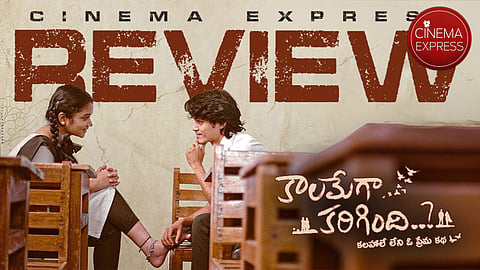Kaalamega Karigindhi movie review: An exhaustingly poetic take on first love
Kaalamega Karigindhi movie review(2 / 5)
Some films catch your attention from the word-go; others, like Kaalamega Karigindhi, demand your endurance. Directed by Singara Mohan, this Telugu film is an earnest attempt at a poetic exploration of childhood love and memory. It is a film less about plot and more about feeling, inviting viewers to immerse themselves in a wistful, atmospheric trance. However, somewhere along the way, the experience turns into an exercise in patience.
Director: Singara Mohan
Cast: Vinay Kumar, Shravani Majjari, Nomiena Tarae, Aravind Mudigonda
Vinay Kumar plays Phanindra, a man in his 30s who returns to his childhood village, flooded with memories of his first love (Nomiena Tarae). As he walks through the school corridors of his past, nostalgia pulls him towards an unanswered question—where is she now? Has she been waiting for him, just as he had unknowingly waited for her? The premise is delicate, the mood meditative. However, the dialogue is relentless.
Vineeth Pabbati’s life-like cinematography and Sai Maneendhar’s sound design sweep you off your feet. Their work, coupled with the evocative music by Gudappan and seamless editing by Ra Yogesh, transports you between those two kids who innocently fall for each other. Those match cuts, smooth transitions, and re-used B-roll footage are some exemplary technical work. The amount of time spent in an edit room to craft a film like this feels palpable. For all its technical beauty, however, the film finds itself weighed down by an excess of poetic dialogue that borders on self-indulgence. There is a fine line between lyrical storytelling and relentless verse. Kaalamega Karigindhi crosses that line within its first few minutes and never looks back.
Telugu cinema rarely dares to strip away plot in favour of pure mood, and Singara Mohan must be credited for breaking the mould. His film is visually rich, with compositions that feel like fleeting memories themselves. Every transition, every match cut, and every slow dissolve is crafted with care. The film is brimming with the kind of nostalgia that feels like a warm, old song playing in the distance. We don’t often see films like these. Nobody dares to completely shatter the formula of a plot and structure. This is guts and minds in the sweetest way possible. But then there is the dialogue where what emerges is not conversation but poetry. Line after line, phrase after phrase, a barrage of lyrical musings so dense that even the most patient viewer feels under siege. One can admire Mohan’s commitment to writing in pure Telugu, a language often diluted in contemporary cinema. But language should invite, not alienate. The dialogue here is a challenge, and not in the way great writing should be. It indulges in verse and stays away from the unspoken silence—doesn’t love reside in the latter?
There were moments when the audience visibly disengaged themselves from the film. By the end of the film, when the female lead asks, “Shall I read the poem I wrote about our journey?”, a loud, collective “NO” roared through the theatre.
It’s a shame, really, because beneath all the poetic excess lies a film of genuine craft. The child actors, Aravind Mudigonda and Nomiena Tarae, bring a rare, unfiltered innocence to their roles. Their performances are effortless, their expressions carrying the weight of young love with a quiet authenticity. In contrast, the adult versions, played by Vinay Kumar and Shravani Majjari, don’t quite capture the same magic. There’s a stiffness in their presence, an overly conscious attempt to match the film’s heightened poeticism.
Kalamega Karigindhi is an experiment in storytelling that almost works. It is visually stirring, emotionally sincere, and unmistakably the work of an auteur with a distinct voice. But even the most beautifully crafted dream can become exhausting when it refuses to let you wake up. Poetry in cinema can be a powerful tool, but like all powerful tools, it must be wielded with restraint.
Singara Mohan’s film is both a triumph and a cautionary tale. It is a reminder that cinema can be brave and unconventional, but also that storytelling is as much about what is left unsaid as what is spoken. Had Kaalamega Karigindhi trusted its own visual poetry a little more, had it let its silences speak, it might have created waves. Instead, it remains a film that leaves you both in awe of its craftsmanship and quietly longing for an intermission.

